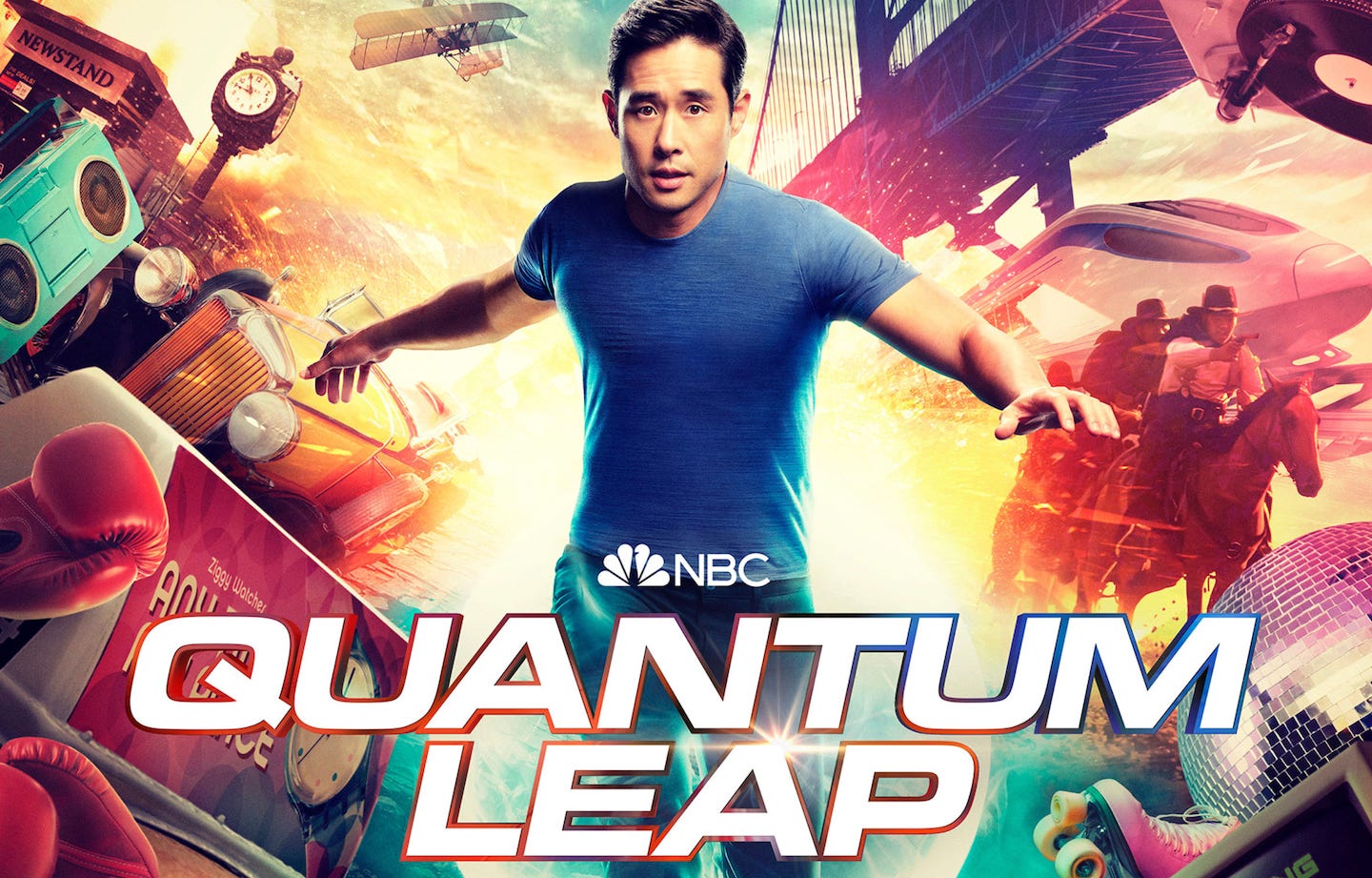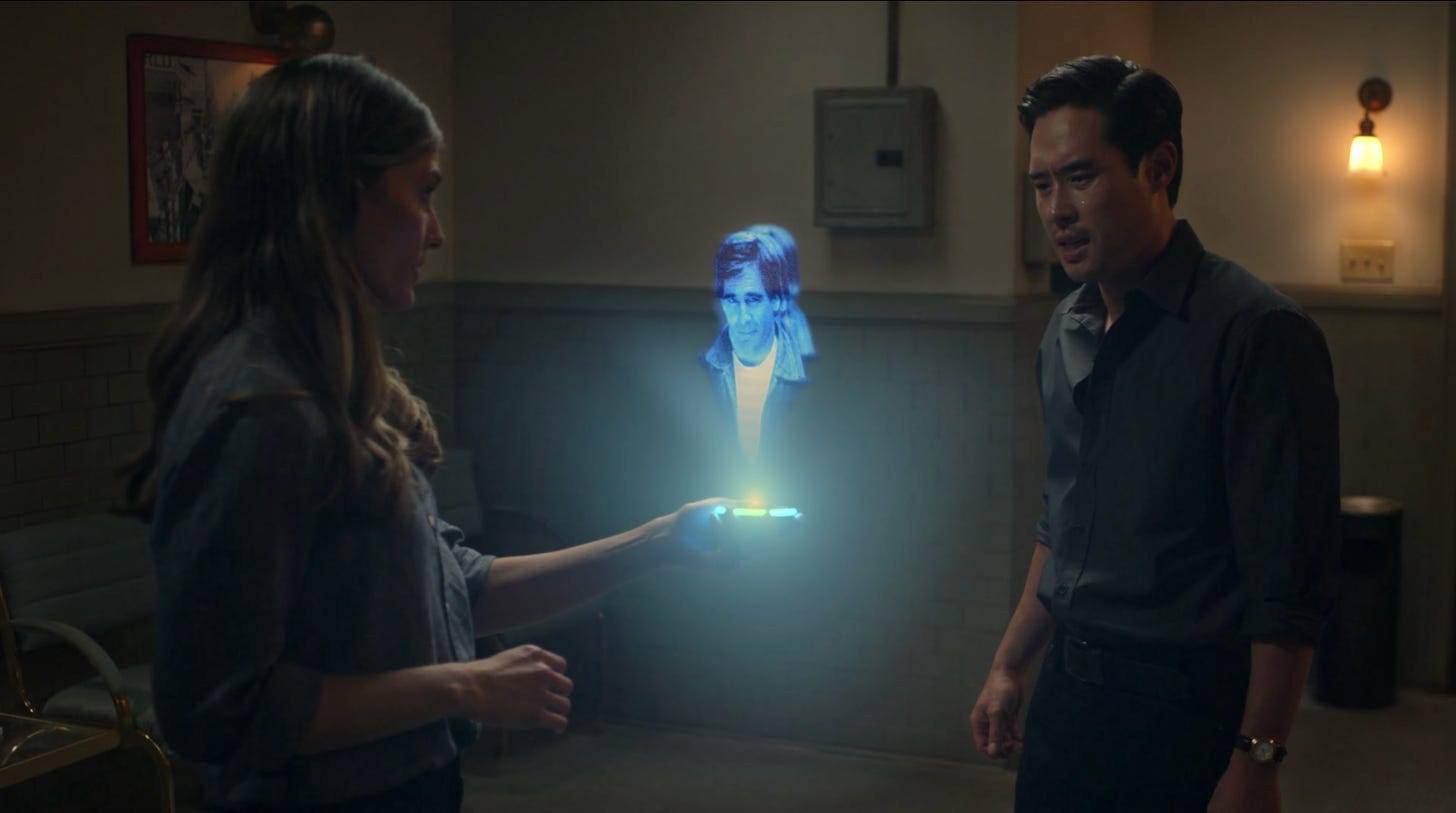Episodic Dialogue: Fall Pilots 2022 - NBC's Quantum Leap
John Aspler joins to discuss NBC's reboot of—sorry, sequel to—the classic procedural
In 2012, when Elementary debuted on CBS, I was TA-ing an Intro to Television course, and we screened the pilot for students ahead of its premiere, which at the time felt like a pivotal lesson in the dynamics of the industry. The property’s familiarity to audiences, its similarity to CBS’ existing lineup, its compatibility with its lead-in, its endless potential to generate story and reach syndication—it embodied how the fall season was built as a microcosm of everything the TV industry stood for, and which it seemed pivotal for students to understand. It was also the year I started writing about Elementary for The A.V. Club, with me and Emily St. James opening things up with an (absurdly) in-depth dialogue on the show’s ties to these broadcast traditions.
In the decade since, though, the logics of broadcast have grown distant for my students, and for much of television criticism as a whole. And so in the spirit of Episodic Medium capturing “the dream of early-2010s A.V. Club” per one paid subscriber, I wanted to put some of this year’s crop of new broadcast series under the microscope with the help of contributors.
To begin, I chatted with Dr. John Aspler (yes, more academics, our time is now), a member of the Episodic Medium community, about the pilot for NBC’s reboot—well, okay, maybe that’s not the right word—of 1989 drama Quantum Leap.
Myles McNutt: A broadcast pilot is somewhat out of the control of its creators. To write a pilot is to accept that there are clear, unavoidable demands that need to be satisfied within that forty minutes, and in precise fashion. You need an introduction that captures the audience’s attention, and keeps them from changing the channel after the lead-in (in this case the season premiere of The Voice). You need to deliver enough information about the premise for them to follow along, but enough mystery to keep them invested. You need characters that are recognizable enough to be relatable, but also distinct enough to seem novel.
All of this has always been true, including in 1989 when Quantum Leap made its original debut, but around the halfway point in the intervening 32 years there was a new prompt: you need to do all of that and also plant the seeds for something bigger than the pilot, that would have viewers imagining their invested accumulating more and more, week after week. It’s a huge part of why television is now more than ever littered with “I.P.” It’s not that broadcast television is creatively bankrupt—rather, there is more space for writers to be creative when they can shorthand certain details by leaning on an audience’s familiarity with some pieces of the puzzle.
But broadcast pilots are sort of sunk regardless. Quantum Leap indeed relies on the audience’s basic familiarity to launch more quickly into its story, and circles back again at the end for some instant mythology, but it otherwise has to balance introducing characters and establishing its premise while telling a time travel-fueled episodic story. Whatever creative flexibility offered by being attached to an existing I.P. was never going to emerge within those confines, leaving this as a gesture to potential more than a vital story.
Still, though, I love the rote rhythms inherent to the task at hand. There’s the choice of 1985 as the perfect cross-section of nostalgic needle drops for fans of the original show and period distance for younger viewers watching on Peacock (or not watching, given its absence from my students’ radars). There’s the amnesia that forces the diegetic explanation of the premise, but only after first being interrupted by a car chase, lest you think this is a show bogged down by its science (although, like, this pilot gets bogged down by its science anyway). And there’s the act breaks, a lost art to future generations, pushing us forward bit by bit into Dr. Ben Song’s quest to save a man he just met, for reasons he doesn’t understand, with the hope of leaping back to his fiancé and friends back home.
John, I know that you’ve got more familiarity with the source material than me. What was it like to experience similar beats in a new context, and what stood out to you about the choices producers made within the limitations of the format?
John Aspler: So much of the premise—and it’s a great premise—remained the same in ways that appealed to me, a fan of the I.P. We still have a charming amnesiac leaper and his trusted hologram. They must still “put right what once went wrong” before leaping again. And we will still (presumably) move around between time periods and cases-of-the-week that allow the show to shift genres as desired. But instead of centering two buds/white guys experiencing a variety of identities in ways that would not hold up to scrutiny today, it centers an Asian-American leaper and his fiancé (not that he remembers their relationship), adding a productive level of drama and pathos, including the tension that she was supposed to be the leaper with Ben as her hologram. And, unlike its predecessor, we get to spend time in the present with a larger cast unraveling the mysteries of Ben’s decision to leap while also helping him solve each case.
But these updates are also a source of some of the pilot’s limitations. By spending so much time in the present, while also doing the hard work of introducing a high-concept premise and sketching out a full cast, we lose time that could have helped make characters like down-on-his-luck Ryan and his sick wife feel like more than just generic procedural archetypes. That the case was resolved so casually via infodump at the end was also a bit off-putting, with not enough time given for the payoff to feel good or for the emotional beats to have felt earned. But I suppose the case isn’t really the point—the promise of the premise (or, as you put it Myles, the gesturing at potential), including high-octane action sequences, is what will bring me back.
I was a young teen in the early ‘00s when I first watched Quantum Leap (1989). It was one of those ‘90s sci-fi shows airing in reruns on the Canadian Space channel alongside every Star Trek ever. But unlike Star Trek which explored contemporary issues via futuristic allegories, Quantum Leap directly and concretely addressed those issues in their own time, the (then) recent past of the ‘50s through ‘80s—issues like institutionalization, civil rights, the price of war, sexual assault, and more. Some (much?) of it certainly has not aged well—it's still a show from the early ‘90s about two clueless white dudes saving the day—but it swung big, wore its earnest heart on its sleeve, and tried to tell stories about sensitive and timely topics. As a show fundamentally about developing empathy for others by (literally) walking a mile in their shoes, Quantum Leap was meaningful for teen me at a time when I was forming my political identity. In the hands of the right showrunners, a new Quantum Leap could revisit and redress some of the (in hindsight) clunky, problematic, and outright terrible approaches to identity the show embodied from a new perspective.
This pilot didn’t do that, but I can appreciate that the complex issues I want a Quantum Leap sequel to address would not be feasible in the episode establishing the premise; indeed, perhaps unsurprisingly, Ben leaps into a bearded white guy, leaving limited room for questions about identity in an already packed pilot (a pilot that also had to connect itself to the mythology of the past). The biggest strength of Quantum Leap was to speak to important social issues in small intimate ways; I am hopeful that this sequel series can eventually grow in that direction.
I’m curious Myles – the choice to make this a direct sequel rather than a reboot is interesting. Did the sequel elements work for you, and how do you feel they might inform the storytelling and episodic structure moving forward?
MM: To your point, nothing about a pilot can be small or intimate. It needs to be big, always gesturing to something bigger, which is part of why they end up hand-waving the actual resolution to Ryan’s story the way they do. As these types of shows have become more serialized, the burden a pilot faces on that front has increased, and it means that Ryan and his fate are more or less irrelevant to the emotional appeals to audience attention because of how much more perspective we’re getting from the “present” storyline. It’s why I’m glad they didn’t try to gesture too much to identity within those limitations—they’d never have been able to do it justice, and it’s acceptable that an amnesiac time traveler would be more focused on the basic facts of his situation this go-round.
And so the sequel/reboot of it all is interesting. They’ve been consciously using sequel as the language (to the point it’s in the title of this Kelly Clarkson Show cross-promotional appearance by Raymond Lee), a choice that is rare in television and not really supported by the facts on the ground given all the new characters/situations we’ve been introduced to. Matt Singer’s “legacyquel” term is probably more apt here, but even there “Al Callavici’s daughter, who we barely meet” is not exactly a lot to hang your hat on for the “legacy” part of things. But by calling it a sequel, it seems to create the burden that the endgame here—or at the very least an endgame—is for Ben Song to find and rescue Sam Beckett, a promise that may or may not come to fruition depending on the show’s uptake with audiences (and whether we take Scott Bakula at his word he has “no connection” to this project).
As someone coming at this without a legacyquel framework—I realized at the end the “that’s a Navy ring” was supposed to be a clue the audience could get before the characters—I feel the show has a lot of work to do to invest me in the expanded cast of characters before they double down on the sequel elements. But that is, again, something the pilot really doesn’t have time to manage, focusing (rightly or wrongly) on the core tragedy of the amnesiac fiancé who was convinced to abandon the people he loved for a secret mission.
So I guess my closing question for you as someone more connected to this I.P.: does Ben need to find Sam for this to be satisfying? Or are the thematic parallels going to be enough? Beyond the identity-focused storytelling you outline above, what else do you feel the show needs to do before its midseason finale to reach its potential?
JA: That's an excellent question; for me, finding Sam has become a problem of this 'legacyquel's' own creation. I would have been happy to just vibe on thematic resonance and easter eggs in a straight reboot, but with multiple references to Sam never having made it home, my expectations have been raised that the original series and its loose ends will be serviced in some way. Introducing us to Al's daughter as part of the mystery of Ben's motivations heightens that particular possibility to the point that I don't think I'll be totally satisfied without a resolution. Scott Bakula's involvement wouldn't even be strictly necessary in a show about people leaping into other people. But that poses another structural challenge for a broadcast show that may want to run as long as possible: How long can they stretch this mystery, and is Sam's connection to the show something that could be addressed by midseason? Would new viewers even care? It'll be a difficult and fine balance to get right, but, hopefully, choosing to make this a sequel was a decision informed by precisely these challenges.
MM: We often say that procedurals are predictable, but in a contemporary environment there’s still a fair bit of flexibility in how they perceive the serialized story they’re telling. Sam is too conspicuous to think he’s not important, but he’s not so important that a new viewer with zero context would be invested without significant additional setup. And you’re right that by making this a sequel, that was their choice, which means that they now have to find a way to make the actual procedural stories engaging while keeping those balls in the air.
John will be back later in the year to reflect on how Quantum Leap is progressing as of its winter finale, provided that it won’t be lost to time by that point. And I’ll be back to discuss more fall broadcast pilots in the weeks ahead with other new contributors. Subscribe to stay up to date.








I like the sequel/legacyquel format for the new Quantum Leap and I will be shocked if Bakula isn't lying through his teeth about his lack of involvement. I do think that introducing a big mystery / master plot right out of the gate comes with some risks; QL was the quintessential story of the week show and now they have the burden of marking progress towards the fireworks factory every week rather than just letting us enjoy the trip. And while it's always nice to see Ernie Hudson, I'm not sure about the bigger cast yet.
Real talk though: Did they think we weren't going to notice the retcon of how Project Quantum Leap works? What about the waiting room? If we're going to be spending so much time in the present, the leapees ought to play a bigger role.
When I was a kid, Quantum Leap was a show I'd occasionally watch, and I was really excited to see what was in store for the series finale... and, woof, that end title card they tacked on made it one heck of a gut punch. In terms of "TV finales that weren't written and filmed as finales and, therefore, end up emotionally devastating," I always associate it with Alf, weirdly enough!